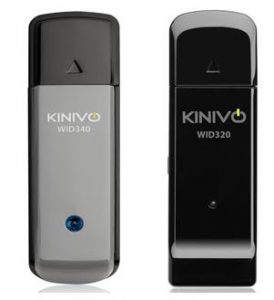Kinivo releases a pair of inexpensive Linux-friendly USB wireless adapters
 Nowadays, if you buy a laptop, it will have a built-in wireless card (desktops; not always). For the most part, these integrated cards work well -- on Windows. You see, most manufacturers build their machines with only Windows in mind. If you only use Microsoft's operating system, you should be golden. However, for nerds that like Linux (including myself), nonexistent or problematic wireless drivers can be an absolute nightmare.
Nowadays, if you buy a laptop, it will have a built-in wireless card (desktops; not always). For the most part, these integrated cards work well -- on Windows. You see, most manufacturers build their machines with only Windows in mind. If you only use Microsoft's operating system, you should be golden. However, for nerds that like Linux (including myself), nonexistent or problematic wireless drivers can be an absolute nightmare.
This is why I recommend a USB wireless adapter to every Linux user; you never know when you may need it as permanent or temporary internet solution. Unfortunately, not all USB adapters work with Linux out of the box, so the model you choose matters. Today, Kinivo releases two USB wireless adapters that are promised to work with Linux-based operating systems.
"Kinivo, producer of consumer electronics and mobile device accessories for everyday life, introduces their second-generation Wireless Enhanced USB Adapters; the WID320 and WID340 all-in-one solutions for enhancing existing Wi-Fi capabilities. Catering to different needs and price points, the WID340, available for $15.99, has dual-band capabilities allowing users to connect to 5GHz and 2.4GHz networks and support speeds up to 300 Mpbs. The WID320, available for $9.99, connects only to 2.4GHz networks. Simply plug either adapter directly into the USB port of your device, or place the USB up to three feet away using the included extension cable to increase speed, improve signal strength and heighten overall wireless Internet performance at different levels", says Kinivo.
The manufacturer further explains, "the less expensive WID320 connects to 2.4GHz networks only, which is ideal for professionals who work from home or families with multiple devices under one roof. Using Infrastructure, Ad-Hoc and Soft AP working modes, users can share bandwidth accordingly with other nearby devices. Like the WID340, the WID320 is also compatible with Windows, Mac OS X, and Linux, and offers security encryption using WEP, WPA and WPA2 (TKIP+AES)".
In my case, I have the really nice ASUS PCE-AC68 in my desktop. I chose this because it works well with both Windows and Hackintosh. However, on Linux, because it is Broadcom-based, it will not work without installing some restricted drivers. For this reason, having a Linux-compatible USB wireless adapter can be a godsend when installing Fedora for the first time. Quite frankly, the WID340, at $15.99, should be fast enough to be a permanent solution in budget desktop builds. Raspberry Pi users should take notice too.
Have you ever had wireless woes on Linux? Tell me in the comments.
